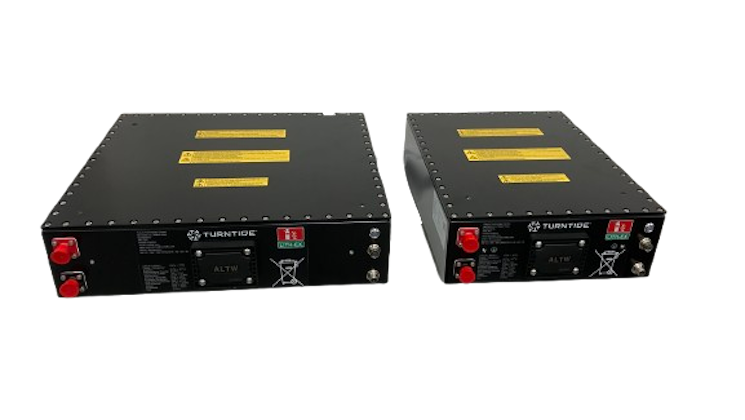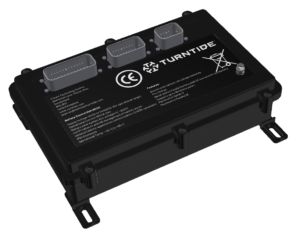6 Benefits of Modular Batteries
Modular batteries provide many benefits to original equipment manufacturers (OEMs). They are an increasingly essential element of vehicle electrification and are changing the energy storage landscape. A growing number of off-highway electric vehicles (EVs) are adopting modular battery systems to meet the demanding requirements of industry sectors such as:
- Construction
- Agriculture
- Industrial equipment
- Marine
This white paper explores the key benefits of modular batteries and their applications for off-highway EVs and equipment. It highlights their scalability, customizability, safety, maintenance, and environmental advantages.
1. Flexible & Scalable
Modular batteries allow for easy scaling of energy storage capacity and power requirements. This flexibility is crucial for off-highway applications where energy demands can vary significantly based on industry sector, vehicle type and even customer usage patterns.

By simply adding modular battery packs in parallel, the OEM can optimize the design to suit different usage profiles of the same vehicle. These profiles include more capacity for multiple shift operations, fewer batteries and lower cost for single shift operation options.
This scalability makes multiple power and energy vehicle variants available to the OEM, meaning that they can offer a broader selection of products with minimal design costs. The modular approach also allows for batteries to be added or rearranged in design iterations that support changing specifications and emerging requirements.
By implementing a modular battery system, the verification and certification stages of a project can be considerably simplified and shortened as well. By selecting a ready-certified modular battery, it can be used in multiple applications which reduces risk, cost, and time-to-market.
2. Cost Efficient
By selecting modular energy storage, vehicle designers can reduce upfront investment costs in design, verification, and certification. This makes modular batteries an attractive option for small- and large-scale projects and can enable the off-highway EV sector to compete with diesel-powered vehicles on total cost of ownership and performance.
Outsourcing the battery design for a vehicle electrification project allows companies to save years of development time and avoid the need to recruit specialist design, supply chain, test and certification resources. They also avoid the setup and running of battery assembly facilities which could be very significant portion of the vehicle assembly cost.
3. Customizable & Versatile
Modular systems can be customized to meet specific energy requirements of the application. This adaptability is crucial for applications such as low-volume production or specialized vehicles.
Modular batteries can be arranged to accommodate different system layouts and application needs. On a vehicle or piece of equipment, this could be confined or non-uniform spaces or the modular battery system could be split and have batteries at different locations on the vehicle. This makes them suitable for a diverse range of vehicle applications and for static energy storage and renewable energy systems.
4. Safe & Reliable
Modular battery systems include advanced safety measures such as overcharge protection, deep discharge protection, and temperature monitoring. These features help prevent failures and ensure the longevity of the battery which maximizes the vehicle on road time.
Each module is equipped with its own cell monitoring unit, which forms part of the battery management system (BMS). This allows for:
- Real-time monitoring of voltage, temperature, and current
- Early detection of anomalies
- Automatic shutdown or isolation of problematic modules
In a redundant system design, if one module fails (because of overheating, short-circuiting, or degradation), it can be isolated from the rest of the system. This prevents a single point of failure from escalating into a system-wide hazard.

Modular systems allow for more efficient heat dissipation and targeted cooling. Since each module can be monitored and cooled individually, the risk of thermal runaway is reduced.
If a module becomes unsafe or degraded, it can be replaced without dismantling the entire system. This reduces downtime and ensures that the system remains safe and operational. In critical systems, modularity allows for redundant modules that can take over if one fails, ensuring that the rest of the system continues to function without interruption.
5. Simplified Maintenance
Instead of replacing the entire battery pack, end users can simply swap out only the defective module. This is also the case with BMS faults. Issues can be addressed without having to replace cells or batteries in the rest of the vehicle. This reduces downtime, transport costs, repair costs, and waste and environmental impact.
Each module can be monitored individually, with its own sensors and diagnostics. This facilitates the rapid identification of underperforming or failing modules and targeted troubleshooting without disassembling the whole system. With real-time data from each module, predictive analytics can forecast when a module is likely to fail. This allows for scheduled maintenance before failures occur.
Modular systems are typically designed with accessibility in mind. This means that easier physical access is available to individual modules with less complex disassembly procedures and reduced risk of damaging other components during maintenance.
6. Environmental Benefits
Modular battery systems offer several environmental benefits, making them more sustainable choices when compared to traditional, monolithic battery designs. Electronics waste is reduced because only faulty modules need to be replaced, not the entire battery pack. This extends the overall lifespan of the system and reduces the volume of discarded batteries.
Modular systems are easier to disassemble, making the recycling of individual components more practical, and reuse becomes possible by using healthy modules in secondary applications (like energy storage). Modular designs align well with the circular economy principles of design for longevity, repairability, reusability and recyclability.
By replacing only parts of the system, fewer raw materials (like lithium, cobalt, and nickel) are needed over time. This helps reduce the environmental impact of mining and material processing.
Companies embracing modular battery systems can also reduce their carbon footprint over the lifecycle of their products. This is because fewer replacements and repairs mean less manufacturing, shipping, and disposal, all of which contribute to a lower overall carbon footprint.
Conclusion
The benefits of modular batteries include scalability, customizability, improved safety, simplified maintenance, and environmental sustainability. As the demand for efficient and flexible energy storage solutions grows, modular batteries are poised to play a crucial role in advancing sustainable energy practices.